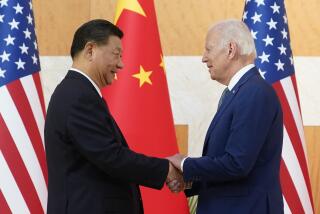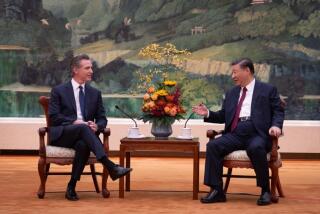China Foreign Minister Faults U.S. for Icy Visit : Diplomacy: But Christopher tries to end prickly mission on a positive note. He cites human rights talks.
- Share via
BEIJING — Chinese Foreign Minister Qian Qichen blamed the United States for tensions and hostility surrounding the four-day visit by U.S. Secretary of State Warren Christopher that ended this morning with little or no progress on key issues of human rights reform in China.
Christopher, in a news conference held on the opposite side of Beijing, attempted to put a positive face on the visit that was characterized by some of the frostiest exchanges between the two countries since the dark days of the 1989 Tian An Men Square crackdown.
Christopher insisted that the two governments have begun to “narrow the differences” on human rights issues. He said the principal value of his trip was that “the Chinese side understand the position and views of the United States.” But, he went on, “more work needs to be done.”
Brushing aside Clinton Adminstration concerns about the wave of arrests and detentions of Chinese dissidents leading up to the Christopher visit, the first by a U.S. secretary of state since 1991, Qian charged in a news conference this morning that “the U.S. side should be held accountable for all the consequences” of the failed talks.
The foreign minister, who is also a vice premier in the government and considered a moderate in the Chinese political scheme, said the main “mistake” made by the Americans was a Feb. 27 meeting between U.S. Undersecretary of State John Shattuck, in Beijing to prepare for the Christopher visit, and prominent Chinese dissident Wei Jingsheng.
During the 90-minute meeting, apparently sought by Wei and arranged by the U.S. Embassy, Wei reportedly urged Shattuck, the former American Civil Liberties Union director and the Clinton Administration’s special envoy on human rights, to “be tough” with China. Qian said China viewed the meeting as “interference in China’s internal affairs.”
Again and again, Shattuck’s meeting with Wei came back to haunt Christopher in 10 hours of talks with senior Chinese leaders.
Only two weeks before Christopher’s visit, both countries appeared optimistic that they could reach an agreement on several human rights issues that would meet the requirements of President Clinton’s executive order requiring “overall, significant progress” on human rights in China before a June 4 deadline on renewal of China’s low-tariff most-favored-nation trading status with the United States.
But China’s outrage over the unannounced Shattuck meeting with Wei, leader of the 1978-79 Democracy Wall movement who was released from prison on parole in September after serving 14 1/2 years of a 15-year sentence, and U.S. concerns about the arrests and detentions of dissidents turned the visit into one of the chilliest Sino-U.S. since the reaction to Chinese troops attacking protesters in Tian An Men Square.
The only new agreement announced at the end of Christopher’s trip was a “memorandum of understanding” concerning the right of U.S. officials to make sure China is not exporting products made with prison labor. And that agreement merely codified what had been worked out two months ago.
Christopher also said Qian had pledged to settle a few outstanding emigration cases, opening the way for the families of some Chinese dissidents to travel abroad. “I expect this to be done quite promptly,” the secretary of state said.
But China was unwilling to make any of the sort of dramatic gestures for which the Clinton Administration had been hoping. Christopher acknowledged there had been no breakthrough, such as a release of “prisoners of conscience” jailed for crimes the Chinese call counterrevolutionary.
China was also unwilling to go along with a U.S. request to stop the jamming of the Voice of America. The best Christopher could achieve was a pledge by Qian to “review information” on this issue.
Christopher, in his emphasis of the positive, said the United States was seeking “a broad relationship” with China.
But even in the final hours of the trip, there were signs of the strains that emerged before and during the visit. Christopher, at his final news conference, urged China “to release all those citizens who were arrested or detained at or before the time of my arrival here.”
A telling indication of the frigid mood surrounding the visit was the cancellation, at the request of the Americans, of a joint news conference by Qian and Christopher scheduled for this morning. Instead, each side held separate news conferences on opposite sides of the Chinese capital.
Qian said that despite their differences, the two countries agreed to continue high-level diplomatic exchanges in hopes of reviving the flagging relationship.
Among the few positive notes, Qian said, was an agreement for continued exchanges between the two nations’ military and defense officials. The Defense Department has been a principal advocate in the Clinton Adminstration for stronger U.S.-China relations with less emphasis on human rights.
More to Read
Sign up for Essential California
The most important California stories and recommendations in your inbox every morning.
You may occasionally receive promotional content from the Los Angeles Times.












